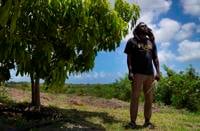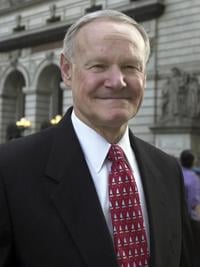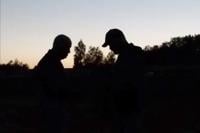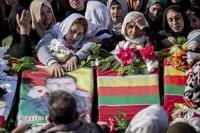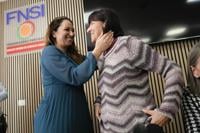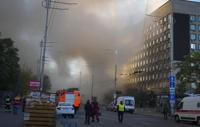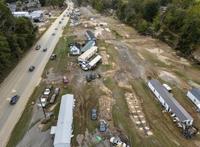LIBERTA, Antigua (AP) — On the same ground where their enslaved ancestors were forced to plant sugar cane, Rastafari in this small island nation are now legally growing and ritualistically smoking marijuana.
For Rastafari, the practice brings them closer to the divine. But for decades, many have been jailed and endured racial and religious profiling by law enforcement .
The government of Antigua and Barbuda has sought to right that wrong. The twin islands recently became one of the first Caribbean nations to grant Rastafari authorization to grow and smoke their sacramental herb.
“We’re more free now,” said Ras Tashi, a member of the Ras Freeman Foundation for the Unification of Rastafari, who was arrested for growing cannabis.
On a recent Sunday, he led chants in the tabernacle on the foundation’s farm located in Liberta’s lush agricultural district. Tashi puffed on a corn husk-wrapped joint while others passed chalice pipes and waved Rastafari flags in green, gold and red.
“The government gives us our religious rights … we can come and plant any amount of marijuana … and no police can come and take up any plant. We fight for that right — and we get that right,” he said.
Rastafari elsewhere are pushing for similar religious protections. Experts and stakeholders think the Antigua and Barbuda law could boost these efforts worldwide at a time when public opinion and policy continue to shift in favor of medical and recreational marijuana use.
Under the same law change, the island government also decriminalized the use of marijuana. In addition to the expansive religious use granted Rastafari, people outside the faith can grow four cannabis plants each and possess up to 15 grams.
“We believe that we have to provide a space for everyone at the table, irrespective of their religion,” Prime Minister Gaston Browne told The Associated Press at an interview in the capital city of St. John’s.
“Just as we’ve recognized other faiths, it’s absolutely important for us to also ensure that the Rastafari faith is also acknowledged.”
Rastafari reject materialist values and often practice a strict oneness with nature, eating only unprocessed foods as part of “Ital” their faith’s vegetarian diet. They also let their hair grow, uncombed, into dreadlocks.
But many were long treated as second-class citizens across the Caribbean islands, looked down on for their .
The prime minister said that growing up in Antigua, he witnessed how adult Rastafari were chased by police, while . Browne also recalled how members of the Rastafari fed him “Ital” meals when his single mother, who had a mental illness, struggled to raise him and his siblings.
In 2018, Browne apologized publicly to the Rastafari community for the oppression and religious persecution they suffered. He also said that Rastafari should be given a stake in the production and economic benefits derived from medicinal marijuana as reparations “for the wrongs inflicted on this significant minority group in our countries.”
His government also led efforts to decriminalize marijuana use. Earlier this year, he met with Rastafari groups and granted them licenses from the country’s medical cannabis authority to grow the plant for religious purposes.
The changes faced some opposition from some politicians and Christian leaders in the socially conservative Caribbean region. But Rastafari academics praised Browne’s apology and his government’s actions, saying this tiny nation of about 100,000 people has gone further than regional efforts by larger countries, and could set a global example.
and granted sacramental rights to cannabis. But Charles Price, a professor at Philadelphia’s Temple University who focuses on Rastafari identity, said that Antigua and Barbuda’s comprehensive initiative could spur more organizing for the sacramental recognition of cannabis in other islands.
They've become “test cases for the rest of the Caribbean,” he said. “They’ll suggest the viability of this … so other nations can now look to these two nations and say, ‘Ah, they’ve done it.’”
Through a lease from the government, a former sugar cane plantation — a symbol of slavery and British colonial oppression — in Antigua has been transformed into worship grounds, sustainable farmland and the headquarters for , one of the island’s main Rastafari groups.
“This might be a small win, but it’s something we can definitely celebrate and feel proud of — that lands that were once used to enslave our people, we’re using it to liberate our community,” said Ras Richie, a member of the group. He’s also co-founder of , which leads eco-tours to the Rastafari farm and sacred grounds where cannabis, fruit and vegetables are grown.
During that recent Sunday worship service, the breeze fluttered leaves on the marijuana fields surrounding the stone remnants of a sugar mill.
Inside the nearby tabernacle, it moved clouds of fragrant marijuana smoke that hung in the air while Ras Freeman members chanted psalms, ululated and banged on drums.
“The attitude towards it has dramatically changed and it’s more in a positive light,” Ras Kiyode Erasto, Ras Freeman’s chairman said outside the tabernacle, while he grasped branches of dry cannabis.
“We give thanks for the prime minister … his government bravely stand up with courage to decriminalize, and to even give sacramental rights to the Rastafari community.”
Erasto suffered bullying and discrimination growing up. At one point, he said, his mother had to cut his dreadlocks so he could be allowed in school.
Throughout his adulthood, he joined marches demanding fair treatment for his community and traveled to conferences led by the Caribbean Rastafari Organization to advocate for the sacramental right to cannabis.
“One go through a lot of struggle, especially with the cannabis,” said Shakie Straker, Erasto’s mother, after she sang and praised for hours during Sunday worship. “One pay a lot of money, fines to the court. Man go to jail. Man even lose their life. And this is the struggle, but (now), it’s 100% better.”
To purify the land, the group keeps a bonfire always burning near their house of worship. They cook and share meals of coconuts, cassava and carrots produced on their land. They keep a strong presence on social media with images introducing visitors to their culture and faith. And they have plans to expand, hoping to build a museum, a store to sell their Ital food and a sacramental cannabis dispensary.
“What gives me hope is now that we are reaching out to different parts of the world and realizing the respect that Rastafari has,” Ras Richie said. “That’s the power we have now.”
__
Associated Press religion coverage receives support through the AP’s with The Conversation US, with funding from Lilly Endowment Inc. The AP is solely responsible for this content.


